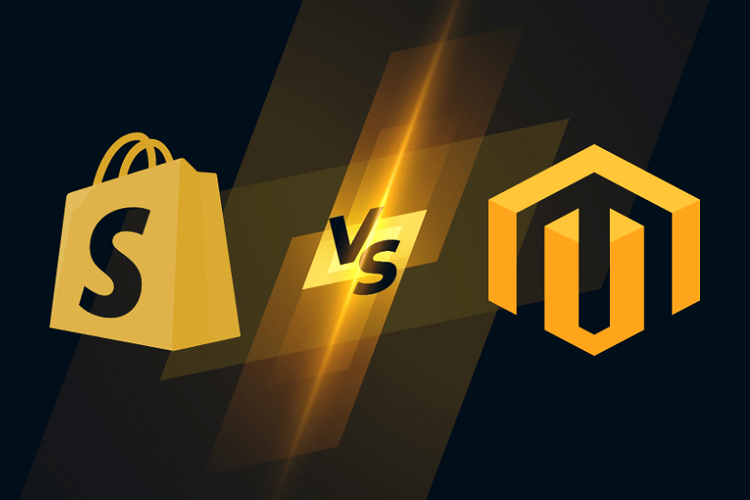Whether you’re a startup or an already established brand, every business keeps exploring new options and better market opportunities. Well! If you’re also someone looking for new growth options, strengthening your online presence and choosing the right eCommerce platform for the same is necessary.
You’ll be shocked to know that the global ecommerce market is expected to total $4.89 trillion this year. With this eCommerce development is necessary for your business.
If you’re also looking for Magento eCommerce development or are confused to find the best platform, you should read the article below!
When you look around, you’ll realize many big names like WooCommerce, Shopify, Magento, and BigCommerce are dealing in eCommerce development. Amidst all these names, there is a lot of confusion about which is the best platform.
Are you having the same difficulty deciding between Magento and Shopify? Don’t worry; you’re not alone. Many brands out there find it challenging to make a choice! The reason for comparing these two platforms is apparent! These are the two most popular eCommerce development platforms.
When making this critical decision, it only makes sense to know the pros and cons and compare the differences between Shopify vs Magento.
Scroll down and read below to know what are the differences between Shopify vs Magento and which one will be the best option for your eCommerce business. In this we will also tell you about integration services that will help you with the best eCommerce development.
About Shopify
Comparing different eCommerce platforms, Shopify is the most easy-to-use eCommerce solution used to create an online store easily. Shopify’s total platform sales around the world are estimated at $200 billion to date. Based on a cloud-based SaaS service, it will charge you monthly to use the services. It offers different price packs. eCommerce merchants can also use Shopify POS to sell their products.
About Magento
On the other hand, Magento is an open-source platform with 250,000 Magento stores live on the internet. You can install and use it for free. But you’ll have to buy a subscription to access web hosting, security, and extensions. It is considered one of the most powerful platforms for eCommerce development.
It wouldn’t be wrong to say that Magento is the best platform for businesses. To get a better understanding and Magento solutions, you can always opt for Magento eCommerce development.
Shopify vs Magento: Pros and Cons

Shopify Pros
As we’ve discussed, Shopify makes it convenient to set up an eCommerce store. Its advantages are as follows:
Simplicity
One of the best benefits of Shopify is the simplicity and convenience it offers. As a business owner, you would want to focus solely on running a business. You can waste no time dealing with the technical aspects of an online store. Shopify can be easily used by people who are not tech-savvy.
Available Support
Shopify has a dedicated support team. It provides 24/7 customer support through live chat and emails to all its users to resolve their queries earliest.
For better support, you can connect with Magento eCommerce development services. You can also join social Shopify Forums. You can post your questions there, and other users will help you with your queries.
Themes, Themes, and Themes
Your online store should be aesthetically pleasing. It should be cleaner and attractive, and this is where Shopify excels again. It has a wide variety of themes – free and paid ones. Subjects are classified based on industries – such as furniture, art, jewelry, and food.
App Store
With Shopify, you get access to over 1200 plugins and apps. With this wide variety, you will find the best suitable options for your business. It offers apps related to inventory management, accounting, and shipping, which means you will save a lot of time focusing on other aspects of your business. The Shopify App Store is very easy and simple to use if you want to know.
Ease of Marketing
The best way to generate more traffic on your eCommerce platform is to leverage SEO or search engine optimization. When you opt for Shopify, it offers you multiple SEO additions and marketing tools.
It helps you provide attractive discount codes and links to products on different social media platforms. You also get add-ons to gain access to data to measure results and make informed decisions.
Shopify Cons
Value
Shopify is not a free-to-use platform. Yes, you’ll have to pay a monthly fee to access its services. Only a few themes are free of cost; the rest will charge you a fixed amount. In addition, you need to pay a transaction fee every time you sell online unless you are using Shopify Payments.
Limited Customization
Shopify offers various customization options, but it has many limitations. There are many other features, but they cannot be unlocked. Few other similar platforms provide more customization than Shopify.
Magento Pros
Flexible
An open-source platform, Magento allows you to modify/change the code as per the requirements. So, you can customize the templates. In addition, Magento also allows third-party integrations. Flexibility is what makes Magento stand out from its rival platforms. With flexible features, the work becomes more accessible.
Plenty of Features
Magento offers many features to manage multiple stores at a time. Magento integration services supports various languages, locations, pricing, and currencies. If we compare it with Shopify, Magento has better features.
Large Community of Users
As the most used eCommerce platform, there’s a massive community of users. The large community drives the development of new extensions and plugins, ensuring quick support. The larger the community is, the better help you’ll get.
Mobile-Friendly Platform
79% of smartphone users have purchased online using their mobile devices. Thus, a mobile-friendly platform is a must to ensure the success of eCommerce. With Magento, you can easily create a mobile-friendly website and give customers a better shopping experience. This will help increase sales and reduce the bounce rate.
Scalable
Every business owner wishes to expand their business. As the business grows, it is essential to look after the company’s scalability. Some online platforms cannot handle this growth efficiently, but you can take anywhere from a hundred to a thousand products in an hour with a Magento website. This is a notable advantage of Magento that attracts many online sellers.
Shopify Cons
Costly
Users can use the Community edition of Magento for free, but the Enterprise edition comes at a cost. And if you want to opt for the premium enterprise version, it will cost you more.
Time Consuming
Magento takes time to load and hence, is more complicated to optimize than other platforms. It is also difficult to switch from Magento to another platform as the data is imported at a prolonged rate.
Magneto’s flexible architecture is the main reason behind slow loading – it makes it time-consuming and complex.
Hosting
A dedicated server is required for hosting Magento. In addition, it required a high-skill developer, which is seen as a con of this platform.
Shopify vs Magento: Comparison
Ease Of Use
It is challenging to select a platform that will make it impossible to build an online store. Shopify is easier to use than Magento. It is a one-stop-shop – a drag-and-drop website builder. Shopify allows you easy customization options.
With Magento, one needs high knowledge of jargon and coding to build an online store. It is better to opt for professional Magento eCommerce development.
Shopify vs Magento: Taking A Decision
In short, Shopify can be used by everyone irrespective of its technical capabilities, whereas most web developers can use Magento for Magento eCommerce development.
The Theme
The theme of your eCommerce store creates the first impression of your brand among the audience. It should be inspirational, user-friendly, and trust-building.
Shopify has many themes on offer that are much cheaper than Magento. Shopify offers mobile responsive themes. You can customize the Shopify theme by adding new pages, changing the color palette, integrating social media feeds, and much more.
When it comes to Magento, let us tell you that it offers fantastic ready-made themes. These do not require customization. However, if you want to change something, you may need the help of a developer. You’ll easily find various reliable Magento integration services for your help.
Decision
You can decide as per your needs but keep in mind that Shopify offers more comprehensive options for themes, and customizing Shopify’s themes doesn’t require knowing coding.
Apps & Add-ons
To satisfy your eCommerce desires, you can add additional functionality to your website. You can install other extensions, apps, and add-ons on both platforms.
Shopify has over 1000 premium and free apps for various areas related to advertising, marketing, shipping, and more. Magento has over 5000 extensions to choose from.
Decision
Magento has more extensions than Shopify, but you need coding knowledge to install them.
Search Engine Optimization
With the right SEO techniques, you can grab more visitors to your eCommerce website. More visitors will result in better sales and an increased covert rate.
Shopify has many trusted apps for SEO. You can change/edit the page title and image alt tags. But Magento excels in SEO. It comes with several SEO guides to help you get started. You can edit the image alt tag and customize the URL as well. Notably, these are all in-built features on Magento.
Decision
Magento is better than Shopify in this department. Magento is your go-to option to make your website more SEO-friendly with a wide range of in-built SEO features.
Conclusion
So now you’re aware of the various aspects of both Shopify and Magento, you can make an informed decision. Both the platforms have their own set of advantages and disadvantages, but each one is best in its way. While Shopify is more user-friendly, Magento offers flexibility. While Shopify does not require any coding knowledge, Magento does. But if you’re tech-savvy, you can make almost any changes to your online store.


